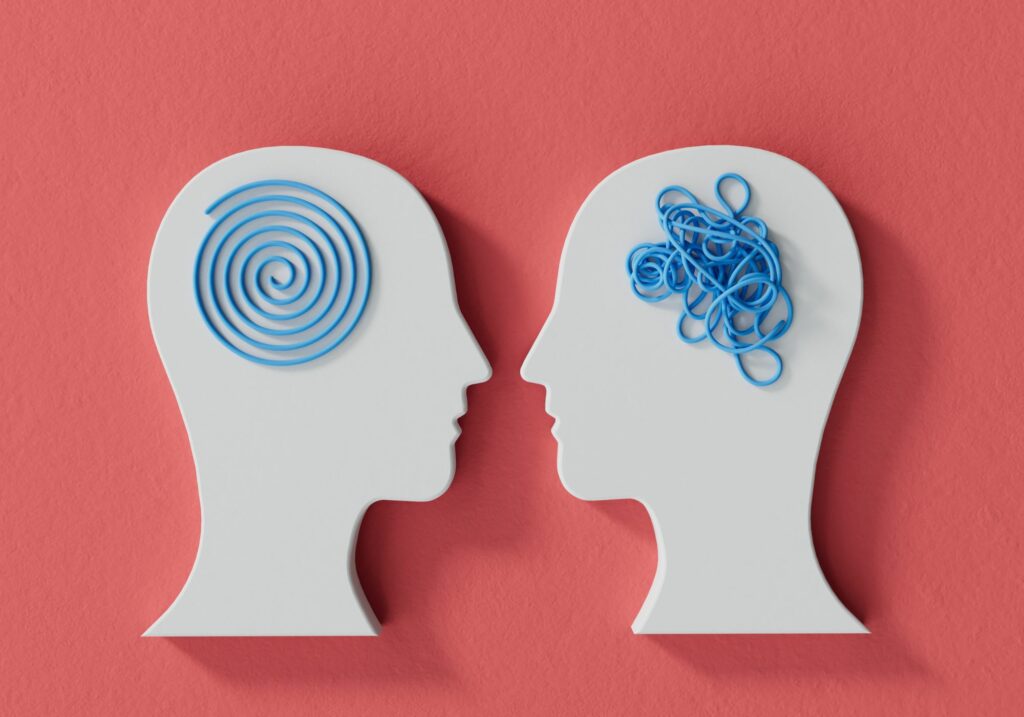Borderline personality disorder (BPD) is characterized by a delicate self-image, leading to impulsive actions and intense, unstable emotions. It’s situated on the spectrum between psychotic disorders, which distort reality, and neurotic disorders, marked by emotional turmoil—this is the origin of the term ‘borderline.’ At Hope Harbor Wellness, we recognize the vulnerability of those with BPD to substance misuse and additional mental health challenges. recognize the vulnerability of those with BPD to substance misuse and additional mental health challenges. Therefore, our borderline personality disorder treatment program in Atlanta looks to help guests identify their issues and find the appropriate mental health treatment program to help them heal.
What Is Borderline Personality Disorder (BPD)?
Borderline Personality Disorder (BPD) is a complex mental health disorder that profoundly affects an individual’s self-image and relationships. It distorts how a person perceives themselves and others, often leading to strained personal relationships. Typically, BPD emerges in early adulthood, and with professional treatment, many individuals can experience significant improvement in their condition.
The development of borderline personality disorder can be linked to various factors, including genetic predispositions, serotonin production issues in the brain, or early traumatic experiences. Studies indicate that the prevalence of BPD stands at 1.6% in the general population and rises to 20% among psychiatric inpatient populations. BPD is characterized by extreme mood swings, rapid changes in interests and values, significant uncertainty about self-identity, and often engaging in risky behaviors such as drug abuse or self-harm. Managing BPD requires careful attention and professional management.
Types Of BPD
While BPD is a singular diagnosis, it can manifest in various ways, with individuals displaying different combinations of symptoms. Mental health professionals have identified four subtypes of BPD based on these symptom patterns:
- Discouraged BPD Characterized by feelings of worthlessness, neediness, and a strong fear of rejection.
- Impulsive BPD Marked by impulsivity, emotional instability, and a tendency to engage in risky behaviors.
- Petulant BPD Involves unpredictable mood swings, irritability, and an intense fear of abandonment.
- Self-Destructive BPD Features self-harm tendencies, self-sabotaging behaviors, and pervasive feelings of emptiness.
At Hope Harbor Wellness, our empathetic mental health professionals are experienced in treating these diverse manifestations of BPD, ensuring that individuals receive the targeted support they need.
Diagnosing BPD: Assessment and Evaluation
At Hope Harbor Wellness, our skilled mental health professionals start by conducting a detailed assessment to accurately diagnose Borderline Personality Disorder (BPD). This process includes a comprehensive review of the individual’s medical and psychiatric history, a deep dive into their emotional well-being, and an evaluation of how these symptoms affect their daily life and relationships. Recognizing BPD is a critical step towards creating a tailored treatment plan, one that meets the specific needs and addresses the unique challenges each person faces. Our team is committed to offering compassionate, evidence-based care from the very start of the diagnostic journey.
Signs Of Borderline Personality Disorder
The symptoms of Borderline Personality Disorder (BPD) can be diverse and not all individuals will display the same signs. Commonly observed symptoms include:
- Emotional instability and difficulty in managing intense feelings
- Persistent feelings of low self-worth
- A pattern of turbulent and short-lived relationships
- Swift fluctuations in opinions and feelings towards others
- Persistent anxiety over being left alone
- Engaging in self-harming behaviors or threatening self-injury
- Tendency to act impulsively and take part in risky activities
- A proneness to sudden anger outbursts or rapid mood changes
- A tendency to shirk accountability for one’s actions
- Episodes of paranoia or loss of contact with reality
- Recurrent thoughts of suicide or self-harm
- Tendency to see things and people in extremes, without a middle ground
- Pronounced and quick shifts in self-identity, mood, and perception
- Challenges with trust and sustaining stable relationships
It is crucial to recognize that these signs might not be present in everyone with BPD, yet many individuals may experience a number of these throughout their lives. Symptoms typically emerge in adolescence or early adulthood, but signs can sometimes appear in later childhood.
BPD can often coincide with other mental health issues such as depression, anxiety, or substance misuse, making diagnosis complex. Full disclosure of all symptoms and worries is essential during a psychiatric assessment to ensure an accurate diagnosis and effective treatment plan. If you our a loved one are struggling with BPD, our outpatient borderline personality disorder treatment in Atlanta, is here to help.
Risk Factors for Borderline Personality Disorder
Research indicates that the development of Borderline Personality Disorder (BPD) is often due to a confluence of genetic, environmental, and social factors. The risk of BPD can be influenced by a variety of elements:
- A genetic inclination: BPD may run in families, suggesting hereditary factors could play a role.
- Irregularities in brain structure and function: Changes in the parts of the brain responsible for impulse control and managing emotions are often seen in individuals with BPD.
- Childhood trauma: Experiences of trauma during critical developmental stages, such as abuse or neglect, are common in the backgrounds of those with BPD.
- Unstable or tumultuous early relationships: Early relationships that are inconsistent or fraught with conflict may contribute to the onset of BPD symptoms.
These factors are not guaranteed to cause BPD but can significantly raise the likelihood of its occurrence. A deeper understanding of these influences is essential for both prevention and the creation of targeted treatment strategies for those living with BPD.
Difference Between Borderline Personality Disorder and Bipolar Disorder
Borderline Personality Disorder (BPD) and bipolar disorder are often confused due to their shared symptom of mood fluctuations, but they are distinctly different conditions. BPD is characterized by swift mood changes that can be triggered by stress or social interactions, leading to intense and often unpredictable emotional responses. This volatility is frequently driven by a fear of abandonment or rejection and can result in impulsive actions.
Conversely, bipolar disorder features more prolonged periods of mood changes known as episodes, which can last for days or weeks. These episodes are less reactive to immediate surroundings and can swing from the highs of mania, where one may feel overly energetic and euphoric, to the lows of depression, marked by deep sadness and a lack of energy. These mood swings in bipolar disorder are intrinsic and not typically a direct response to interpersonal stressors as seen in BPD.
Understanding the nuances between the two can significantly improve diagnosis and treatment. For individuals with bipolar disorder, shifts in mood come with notable changes in sleep patterns, thought processes, and overall drive. These characteristics are less common in BPD, where emotional responses are more about coping with the moment and are deeply entwined with self-image and relationships.
How is BPD Treated?
Outpatient therapy for Borderline Personality Disorder (BPD) incorporates various treatment strategies, with Dialectical Behavioral Therapy (DBT) standing out as a particularly effective method. DBT, an evolution of Cognitive Behavioral Therapy (CBT), is not only beneficial for BPD but also for a range of other mental health issues.
DBT supports patients in mastering their emotions and reactions, equipping them with tools to assess and transform unhelpful behavioral patterns. Patients work closely with DBT therapists to understand the roots of their impulsive emotions and actions, learning to foster more balanced and positive responses. This transformative process gradually builds resilience, healthier coping mechanisms, and a stronger sense of self-worth, leading to better interpersonal relationships.
Historically, BPD treatments faced challenges, but breakthroughs in therapies now offer hope, showing that individuals with BPD can experience significant improvements and a better life quality.
Commitment to the therapeutic journey is crucial, with options ranging from individual psychotherapy sessions to medications or a blend of both. For those in acute distress or danger, a short-term hospital stay might be necessary to stabilize and strategize a detailed treatment approach.
It’s also critical to recognize that BPD often coexists with other mental health disorders, including:
- Mood disorders, which affect 80% to 96% of individuals with BPD.
- Anxiety disorders, found in 88% of cases.
- Substance abuse disorders in 64% of patients.
- Eating disorders, which occur in 53%.
- ADHD, affecting between 10% to 30%.
- Bipolar disorder in 15%.
- Somatoform disorders in 10%.
Understanding these overlaps is essential in providing comprehensive and effective treatment for those living with BPD.
BPD Treatment Options
Psychotherapy is at the forefront of Borderline Personality Disorder treatment and plays a pivotal role in helping individuals regain control over their lives and build healthier relationships. The primary aim of psychotherapy for BPD is to assist individuals in exploring the underlying factors that influence their thoughts, emotions, and behaviors. By gaining insight into these factors, individuals can develop more constructive ways of thinking and interacting with the world around them.
Here, we delve into some of the psychotherapy interventions that have shown remarkable effectiveness in BPD Treatment:
- Dialectical Behavioral Therapy (DBT) DBT is often considered the gold standard in BPD treatment. It is a specialized form of cognitive-behavioral therapy (CBT) that emphasizes mindfulness, emotional regulation, interpersonal effectiveness, and distress tolerance. DBT helps individuals with BPD recognize and accept their personal realities and behaviors. It equips them with essential skills to manage intense emotions and reduce self-destructive behaviors. Through DBT, individuals learn to identify irrational reactions and modify them into more rational emotions and behaviors.
- Cognitive Behavioral Therapy (CBT) CBT is a goal-oriented therapeutic approach that encourages individuals to closely examine their thought patterns, emotional responses, and behaviors. This self-examination helps individuals understand how their thoughts impact their actions and interactions with others. By identifying detrimental thought processes and habits, individuals can work to replace them with healthier alternatives. CBT is highly effective in addressing thought patterns that contribute to impulsivity, self-harm tendencies, and intense mood swings often seen in BPD.
- Group Therapy Group therapy sessions provide a supportive and structured environment where individuals with BPD can interact with others facing similar challenges. Under the guidance of a mental health professional, group members share their experiences, emotions, and coping strategies. Group therapy fosters positive interactions, effective self-expression, and a sense of belonging among participants..
- Individual Therapy Individual therapy sessions with a skilled therapist provide a personalized approach to address specific issues and concerns unique to each person with BPD. During these sessions, individuals have the space to delve deeper into their thoughts and emotions, gain insights into their behavior patterns, and work on strategies for positive change. Individual therapy serves as a safe and confidential space for exploring complex issues and fostering personal growth.
- Family Therapy BPD can profoundly affect not only individuals but also their families and loved ones. Family therapy involves the participation of family members and focuses on improving communication, understanding, and support within the family unit. It helps family members gain insights into BPD, its challenges, and ways to offer effective support. Family therapy can mend strained relationships and provide a supportive environment for individuals in their journey towards recovery.
- Holistic Treatment In addition to traditional therapeutic approaches, holistic treatment methods can complement BPD therapy. These approaches encompass practices such as yoga, meditation, art therapy, and mindfulness exercises. Holistic treatments aim to foster emotional well-being, self-awareness, and stress reduction. They can be particularly helpful in promoting relaxation, self-reflection, and emotional balance, which are essential aspects of BPD recovery.
- Medication-Assisted Treatment In some cases, medication may be integrated into the treatment plan for BPD. Medications can help manage specific symptoms such as mood swings, depression, or anxiety, allowing individuals to engage more effectively in psychotherapy. Medication is typically considered when symptoms are severe or when co-occurring disorders are present. The use of medication is carefully monitored by healthcare professionals to ensure safety and effectiveness.
Comprehensive Approach to Healing with BPD Treatment
BPD treatment is not a one-size-fits-all approach. Rather, it is a comprehensive and individualized journey toward healing and recovery. The combination of these psychotherapy interventions, along with other support services, creates a well-rounded treatment plan designed to empower individuals with BPD to regain control over their lives, build healthier relationships, and develop the skills necessary for long-term emotional well-being.
At Hope Harbor Wellness our dedicated team of mental health professionals is experienced in tailoring psychotherapy interventions to meet the unique needs of everyone with BPD. We believe in fostering a supportive and compassionate environment that empowers individuals to make positive changes and lead fulfilling lives.
If you or someone you know is struggling with Borderline Personality Disorder, we are here to help. Contact us today at (678) 929-6304 to learn more about our specialized BPD treatment in Atlanta, GA and how we can support you on your path to recovery.
The Impact of Untreated Borderline Personality Disorder
Promptly addressing Borderline Personality Disorder with professional help is vital. Untreated BPD can lead to intense distress for the person affected and cause ripples in their social and family circles, often resulting in volatile relationships with loved ones, colleagues, and peers. The emotional turbulence of BPD can disrupt one’s ability to function in educational or professional settings, compounding the disorder’s impact.
Those living with BPD may find themselves drawn to high-risk behaviors, such as erratic driving or unprotected sexual encounters, increasing their vulnerability to accidents, unplanned pregnancies, or exposure to violence. Self-injurious behaviors are a concerning aspect of BPD, carrying the risk of lasting harm and trauma. Moreover, the risk of suicide is significantly higher in those with BPD who forgo treatment, underscoring the critical need for early intervention and sustained therapeutic support.
Can Borderline Personality Disorder Be Prevented?
Borderline Personality Disorder (BPD) arises from a complex interplay of genetic, neurological, and environmental factors, making it challenging to prevent. However, early detection of its signs can significantly alter its course. A family history of BPD can increase risk, highlighting the need for awareness of the disorder’s early symptoms.
Proactive mental health evaluations are invaluable, as they can detect early signs of BPD even before pronounced symptoms emerge. Such measures allow for timely interventions, which can mitigate the progression of the disorder. Building robust support networks, promoting the availability of counseling services, and encouraging open discussions about mental health issues are essential steps in reducing the severity of BPD’s impact.
Ultimately, while outright prevention of BPD may not be possible, early identification and intervention can significantly ease the journey for those living with or at risk for the disorder. Keeping abreast of BPD knowledge and maintaining ongoing communication with health experts is critical for achieving the best care and support.
Borderline Personality Disorder Treatment in Atlanta, GA
Battling borderline personality disorder can be daunting, but you don’t have to face it alone. Hope Harbor Wellness offers exceptional outpatient Borderline Personality Disorder Treatment in a cozy, welcoming environment. Our expert team understands the intricate nature of borderline personality disorder and provides personalized therapy options. These treatments are designed to help you navigate your mental health with confidence and resilience.
Curious about how we can support your journey to wellness? Contact us at (678) 929-6304. Our caring staff is ready to guide you through our program and answer any questions you may have.













